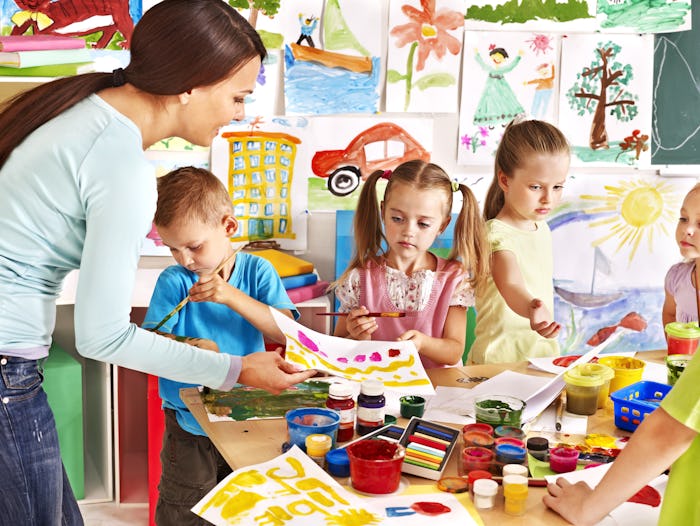Life

9 Things You'll Want To Say To Your Kid's Teacher
After spending more than a decade on the teacher's side of a classroom door, I understand the role of both parent and educator. I loved being a teacher, but there's no doubt that teaching has its challenges. Many of my interactions with student's parents became a source of stress, especially if they asked inappropriate questions or had unrealistic demands. Now that I'm a parent myself, I'm starting to understand that there are a variety of things you'll want to say to your kid's teacher, but don't.
In fact, please don't. I understand the urge, trust me. Sometimes, it will feel almost impossible not to speak up and say what you, in the moment, believe to be absolutely necessary. However, you know that little voice questioning whether you should make a comment at all? The one that makes you stop and think, if only for a second? Yeah, that's probably the voice you should listen to.
All good teachers understand that moms and dads are a child's first teachers and that parents are essential partners in learning. We want to hear parents comments and questions, just not the type of questions that cross boundaries, makes us uncomfortable, break confidentiality rules, or lead to hurt feelings. I know, I know, I wanted to ask my kid's teachers the following questions, too, but I didn't (and neither should you).
"Can You Tell Me All The Classroom Rules?"
At the start of the year, parents are given a handbook of rules and regulations. Most teachers will also either hold an information session, give handouts, create an e-mail list, or set up a message board. They basically go out of their way to provide parents with clear information and instructions.
So, if you wait until the first day of school, when the teacher is dealing with 30 new kids settling in, and pepper him or her with basic questions, you might end up on the naughty list. Just sayin'.
"But My Child Is Special"
Everyone thinks their kid is the smartest, most amazing kid in the classroom. But when parents pull out this phrase, they are usually trying to secure an unfair advantage or talk their child out of some trouble.
All children are unique and have special talents, that's a given. However, trying to elevate your kid above all the other children that have a space in the teacher's heart, probably won't go over too well.
"How Does My Child Compare To The Other Kids?"
I once had a parent demand to see all the other children's writing books in a parent-teacher conference. Not only does this violate privacy rules, it's also a worthless comparison. Each year different cohorts of children represent either low, average, high, or mixed abilities. An individual class offers such a small sample group.
A much more useful question, that doesn't violate privacy, is, "How is my kid doing against national grade levels?" Or, most importantly of all, "How is my kid improving?"
"I Have No Idea How You Do This Job"
I heard this particular sentiment on more than one occasion, and usually while wrangling a class of noisy 6-year-olds. Initially, I will admit, it sounds like they are complimenting your classroom management skills. However, I always wanted to tell those particular parents not to play down their own careers, which are often just as challenging.
"We're Going On A Family Vacation. I'm Sure They Won't Miss Much."
The reason many schools have rules limiting how often parents can withdraw their children from class, is because it does matter. It's not only the time away from the classroom that has an effect. It's that children can miss a whole topic or scheme of work. Once they return, there is a period of adjustment until they are back in the swing of things.
If you also demand that the teacher produces a pack of "vacation work" and expect it to be marked and assessed on your return, you might not win any popularity awards in the teacher's lounge.
"My Kid Said..."
All children lie or embellish or are just mistaken. Whatever you want to call it, it's going to happen at some point and might even be an essential developmental step, according to The New York Times. However, if you prioritize your child's version of events over the teacher's, it can inevitably lead to more problems.
Of course, I am not suggesting for one moment that parents ignore their children's complaints or comments. Just that they seek to find out the whole truth first.
"The Last Teacher Was A Real..."
Even if you hated your kid's previous teacher and thought that they were a terrible educator, it's never a good idea to mention this to your child's current teacher. It can make you look petty, and you're most likely insulting a colleague (or even a friend).
"This Topic Shouldn't Be The Curriculum"
The school curriculum is usually agreed upon at a much higher level than that of classroom teacher. If you have a serious problem with something that is being taught, you should mention it to the class teacher and see what next steps she suggests. However, it likely isn't within her power to change.
"My Kid Would Never Do That"
It can be so hard to confront the fact that our children sometimes misbehave, or say or do unkind things. However, if a teacher is coming to you with a problem, as hard as it may be, you need to listen. Becoming defensive and saying something along the lines of, "My child would never do that," is not going to help the situation and can sound like you're calling the teacher a liar.
Teachers are only human, so sometimes they can and will make mistakes. But most teachers want the best for your child, too, and working together is the best way to ensure your child succeeds.